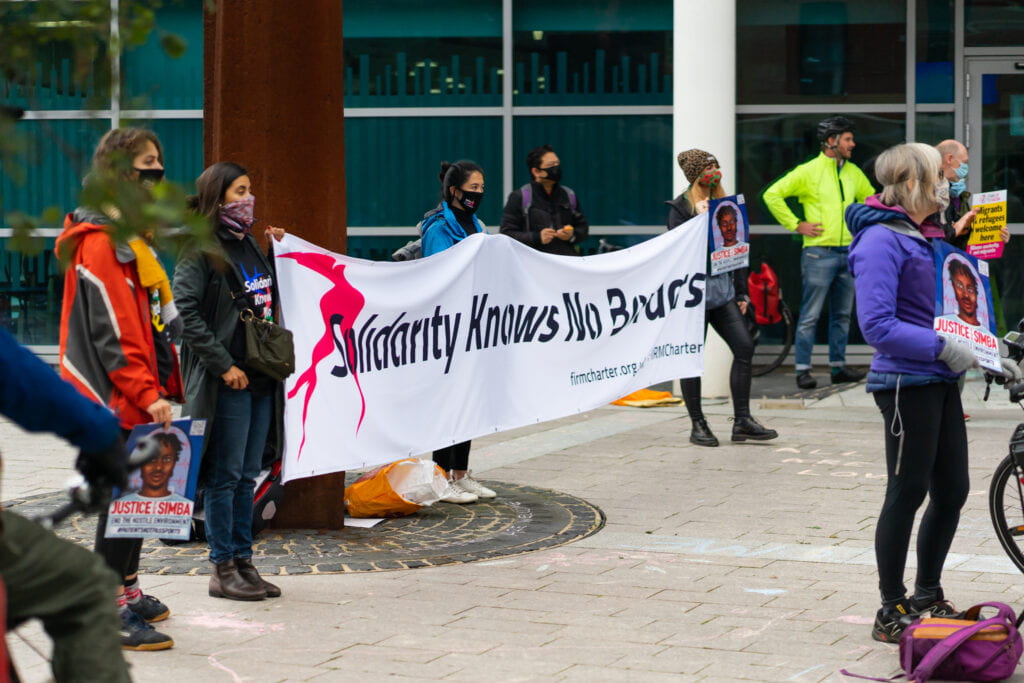A guest blog by Akram Salhab from Migrants Organise.
Last week, the British media began a discussion that revealed the extent to which a hatred of migrants now dominates the national agenda. In the midst of a coronavirus pandemic with hundreds dying every day and Britain leading the world in mortality and infection rates, the BBC began discussing whether or not, at some future date, Britain should consider closing its borders to countries with low vaccination rates.
This discussion highlights the function that attacks on migrants serve within the strategies of Britain’s elite: the identification of a mythical enemy to justify brutal politics and to draw anger away from those responsible for the poverty and failing public services now endemic in Britain. The response to this by certain individuals and organisations of a progressive mindset has been to put out an alternative narrative in the media by attempting to replace dehumanization with stories of integration, positive community relations and solidarity. But can this alone really adequately confront the enormous swing to the right that Britain is undergoing? Given the extent to which the rot has set in in public discourse, attitudes and policies, what realistically would it take to overturn the current status quo?
The migrant justice movement
In approaching these questions we need not start from scratch. In a previous generation, migrants and ‘BAME’ communities were confronted with a British state that, having brought them into the country, then decided they were surplus to the labour requirements of the country’s manufacturing. The acceleration of anti-migrant legislation from the 1960s onwards, paralleled by the rise of the far-right in the streets, was aimed at limiting numbers of migrants and creating violent, hostile conditions for those already living here in order to encourage them to leave. Then, as now, migrants provided an easy scapegoat for a government wreaking havoc on all working-class communities.
To these divisive and inhumane policies, communities in Britain responded in remarkable and innovative ways. Black self-help initiatives were established related to every part of community life, self-defence committees responding to attacks by the far-right were set up and, in the absence of a trade union movement willing to take up their cause, migrant/black communities established their own workers associations that went on strike and won significant victories. All this took place against a backdrop of global anti-colonial struggle that connected struggles at home with those taking place globally. The varied modes of organising, the different models and approaches put forward, and the unification of very different struggles within broad coalitions, joint action and ad hoc committees provide a wealth of ideas for how to organise to confront our current dilemmas.

The most obvious lesson is that, given the current balance of forces, only the organisation of communities in the form of a movement can muster the power necessary to confront existing challenges, and achieve dignity and justice. Such a movement would need to address two central issues: how to build popular organisations with a presence in communities; and how to unite these organisations – together with associations, unions and justice campaigns – in common action.
Efforts are already underway through the creation of the Fair Immigration Reform Movement (FIRM) Charter, which articulates the demands and principles to guide a migrant justice movement. The Charter’s ideas were manifested in a recent nationwide mobilisation, in October 2020, under the banner of Solidarity Knows No Borders with events held in more than 20 locations around the country. A recent video from the weekend of action documents the moves being made towards the creation of a wider migrant justice movement.
Although this is a positive start, it is only a beginning. An effective movement can only emerge once urgent questions of justice and organisational approach are understood and debated collectively. These issues are complex and require the engagement of a large range of migrant rights organisations, community groups, activists, racial justice campaigns, trade unions and progressive politicians. We need to think seriously about how to overcome the divisions between us and build a unified movement.
Solidarity knows no borders
To support this process, Migrants Organise has initiated the webinar series ‘Solidarity Knows No Borders’, which will run from January to April this year. The first session, ‘The Power of the Migrant Vote’, looked at the role of migrant communities in the recent US elections. Organisers from the US spoke about the long-term, grassroots community organising that built the base from which states such as Arizona and Georgia swung in favour of the Democratic Party.
The next webinar, ‘The Struggle for Migrant and Racial Justice in Britain: Lessons from History’, is on 18th February at 6pm and will look at examples from migrant and BAME organising that are relevant to present political work. Everybody is welcome to join this and future events in the series. If you have ideas for other webinars please get in touch.

